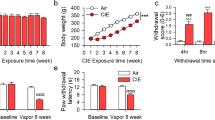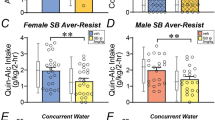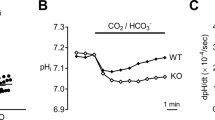Abstract
We tested if cannabinoid type 2 receptor (CB2) in the central nervous system plays a role in alcohol abuse/dependence in animal model and then examined an association between the CB2 gene polymorphism and alcoholism in human. Mice experiencing more alcohol preference by drinking showed reduced Cb2 gene expression, whereas mice with little preference showed no changes of it in ventral midbrain. Alcohol preference in conjunction with chronic mild stress were enhanced in mice treated with CB2 agonist JWH015 when subjected to chronic stress, whereas antagonist AM630 prevented development of alcohol preference. There is an association between the Q63R polymorphism of the CB2 gene and alcoholism in a Japanese population (P=0.007; odds ratio 1.25, 95% CI, (1.06–1.47)). CB2 under such environment is associated with the physiologic effects of alcohol and CB2 antagonists may have potential as therapies for alcoholism.
This is a preview of subscription content, access via your institution
Access options
Subscribe to this journal
Receive 6 print issues and online access
$259.00 per year
only $43.17 per issue
Buy this article
- Purchase on Springer Link
- Instant access to full article PDF
Prices may be subject to local taxes which are calculated during checkout



Similar content being viewed by others
Abbreviations
- CB2:
-
cannabinoid type 2 receptor
- CNR:
-
cannabinoid receptor
- CMS:
-
chronic mild stress
- CNS:
-
central nervous system
References
Enoch MA, Goldman D . The genetics of alcoholism and alcohol abuse. Curr Psychiatry Rep 2001; 3: 144–151.
Knopik VS, Heath AC, Madden PA, Bucholz KK, Slutske WS, Nelson EC et al. Genetic effects on alcohol dependence risk: re-evaluating the importance of psychiatric and other heritable risk factors. Psychol Med 2004; 34: 1519–1530.
Liu IC, Blacker DL, Xu R, Fitzmaurice G, Lyons MJ, Tsuang MT . Genetic and environmental contributions to the development of alcohol dependence in male twins. Arch Gen Psychiatry 2004; 61: 897–903.
Reich T . A genomic survey of alcohol dependence and related phenotypes: results from the Collaborative Study on the Genetics of Alcoholism (COGA). Alcohol Clin Exp Res 1996; 20: 133A–137A.
Reich T, Edenberg HJ, Goate A, Williams JT, Rice JP, Van Eerdewegh P et al. Genome-wide search for genes affecting the risk for alcohol dependence. Am J Med Genet 1998; 81: 207–215.
Peterson LE, Barnholtz JS, Page GP, King TM, de Andrade M, Amos CI . A genome-wide search for susceptibility genes linked to alcohol dependence. Genet Epidemiol 1999; 17: S295–300.
Windemuth C, Hahn A, Strauch K, Baur MP, Wienker TF . Linkage analysis in alcohol dependence. Genet Epidemiol 1999; 17: S403–S407.
Higuchi S . Polymorphisms of ethanol metabolizing enzyme genes and alcoholism. Alcohol Alcohol Suppl 1994; 2: 29–34.
Ehlers CL, Gilder DA, Harris L, Carr L . Association of the ADH2*3 allele with a negative family history of alcoholism in African American young adults. Alcohol Clin Exp Res 2001; 25: 1773–1777.
Konishi T, Calvillo M, Leng AS, Feng J, Lee T, Lee H et al. The ADH3*2 and CYP2E1 c2 alleles increase the risk of alcoholism in Mexican American men. Exp Mol Pathol 2003; 74: 183–189.
Mulligan CJ, Robin RW, Osier MV, Sambuughin N, Goldfarb LG, Kittles RA et al. Allelic variation at alcohol metabolism genes (ADH1B, ADH1C, ALDH2) and alcohol dependence in an American Indian population. Hum Genet 2003; 113: 325–336.
Luo X, Kranzler HR, Zuo L, Lappalainen J, Yang BZ, Gelernter J . ADH4 Gene Variation is Associated with Alcohol Dependence and Drug Dependence in European Americans: Results from HWD Tests and Case-Control Association Studies. Neuropsychopharmacology 2005; 12: 12.
Cowen MS, Schumann G, Yagi T, Spanagel R . Role of Fyn tyrosine kinase in ethanol consumption by mice. Alcohol Clin Exp Res 2003; 27: 1213–1219.
Gerard C, Mollereau C, Vassart G, Parmentier M . Nucleotide sequence of a human cannabinoid receptor cDNA. Nucleic Acids Res 1990; 18: 7142.
Munro S, Thomas KL, Abu-Shaar M . Molecular characterization of a peripheral receptor for cannabinoids. Nature 1993; 365: 61–65.
Colombo G, Serra S, Vacca G, Carai MA, Gessa GL . Endocannabinoid system and alcohol addiction: pharmacological studies. Pharmacol Biochem Behav 2005; 81: 369–380.
Thanos PK, Dimitrakakis ES, Rice O, Gifford A, Volkow ND . Ethanol self-administration and ethanol conditioned place preference are reduced in mice lacking cannabinoid CB1 receptors. Behav Brain Res 2005; 164: 206–213.
Houchi H, Babovic D, Pierrefiche O, Ledent C, Daoust M, Naassila M . CB1 receptor knockout mice display reduced ethanol-induced conditioned place preference and increased striatal dopamine D2 receptors. Neuropsychopharmacology 2005; 30: 339–349.
Zhang PW, Ishiguro H, Ohtsuki T, Hess J, Carillo F, Walther D et al. Human cannabinoid receptor 1: 5' exons, candidate regulatory regions, polymorphisms, haplotypes and association with polysubstance abuse. Mol Psychiatry 2004; 9: 916–931.
Manzanares J, Uriguen L, Rubio G, Palomo T . Role of endocannabinoid system in mental diseases. Neurotox Res 2004; 6: 213–224.
Van Sickle MD, Duncan M, Kingsley PJ, Mouihate A, Urbani P, Mackie K et al. Identification and functional characterization of brainstem cannabinoid CB2 receptors. Science 2005; 310: 329–332.
Ashton JC, Friberg D, Darlington CL, Smith PF . Expression of the cannabinoid CB2 receptor in the rat cerebellum: An immunohistochemical study. Neurosci Lett 2005; 12: 12.
Gong JP, Onaivi ES, Ishiguro H, Liu QR, Tagliaferro P, Brusco A, Uhl GR . Cannabinoid CB2 receptors: Immunohistochemical localization in rat brain. Brain Research 2006; 1071: 10–23.
Sipe JC, Arbour N, Gerber A, Beutler E . Reduced endocannabinoid immune modulation by a common cannabinoid 2 (CB2) receptor gene polymorphism: possible risk for autoimmune disorders. J Leukoc Biol 2005; 78: 231–238.
Karsak M, Cohen-Solal M, Freudenberg J, Ostertag A, Morieux C, Kornak U et al. The cannabinoid receptor type 2 (CNR2) gene is associated with human osteoporosis. Hum Mol Genet 2005; 4: 4.
Brown SM, Wager-Miller J, Mackie K . Cloning and molecular characterization of the rat CB2 cannabinoid receptor. Biochim Biophys Acta 2002; 1576: 255–264.
Onaivi ES, Ishiguro H, Sejal P, Meozzi PA, Myers L, Tagliaferro P et al. Methods to study the behavioral effects and expression of CB2 cannabinoid receptor and its gene transcripts in the chronic mild stress model of depression. Methods Mol Med 2006; 123: 291–298.
Hansson AC, Bermudez-Silva FJ, Malinen H, Hyytia P, Sanchez-Vera I, Rimondini R et al. Genetic Impairment of Frontocortical Endocannabinoid Degradation and High Alcohol Preference. Neuropsychopharmacology 2006; 8: 8.
Hasin DS, Goodwin RD, Stinson FS, Grant BF . Epidemiology of major depressive disorder: results from the National Epidemiologic Survey on Alcoholism and Related Conditions. Arch Gen Psychiatry 2005; 62: 1097–1106.
Hinojosa FR, Spricigo Jr L, Izidio GS, Bruske GR, Lopes DM, Ramos A . Evaluation of two genetic animal models in behavioral tests of anxiety and depression. Behav Brain Res 2006; 168: 127–136.
Lappalainen J, Kranzler HR, Petrakis I, Somberg LK, Page G, Krystal JH et al. Confirmation and fine mapping of the chromosome 1 alcohol dependence risk locus. Mol Psychiatry 2004; 9: 312–319.
Nurnberger Jr JI, Foroud T, Flury L, Su J, Meyer ET, Hu K et al. Evidence for a locus on chromosome 1 that influences vulnerability to alcoholism and affective disorder. Am J Psychiatry 2001; 158: 718–724.
Sampson HW . Alcohol and other factors affecting osteoporosis risk in women. Alcohol Res Health 2002; 26: 292–298.
Schnitzler CM, Schnaid E, MacPhail AP, Mesquita JM, Robson HJ . Ascorbic acid deficiency, iron overload and alcohol abuse underlie the severe osteoporosis in black African patients with hip fractures—a bone histomorphometric study. Calcif Tissue Int 2005; 76: 79–89.
Templeton K . Secondary osteoporosis. J Am Acad Orthop Surg 2005; 13: 475–486.
Cook RT . Alcohol abuse, alcoholism, and damage to the immune system--a review. Alcohol Clin Exp Res 1998; 22: 1927–1942.
Acknowledgements
This work was supported financially by Ministry of Education, Culture, Sports, Science and Technology of Japan, Japan Science and Technology. Also it was supported by William Paterson, University Center for research and Dean, Dr Sandra DeYoung, who provided student worker support for the maintenance of laboratory animals. We also thank Dr Scott Hall (National Institutes of Health, National Institute on Drug Abuse) for technical advice regarding generation of a mouse model of alcohol preference and brain anatomy.
Author information
Authors and Affiliations
Corresponding author
Additional information
Duality of Interest
None declared.
Rights and permissions
About this article
Cite this article
Ishiguro, H., Iwasaki, S., Teasenfitz, L. et al. Involvement of cannabinoid CB2 receptor in alcohol preference in mice and alcoholism in humans. Pharmacogenomics J 7, 380–385 (2007). https://doi.org/10.1038/sj.tpj.6500431
Received:
Revised:
Accepted:
Published:
Issue Date:
DOI: https://doi.org/10.1038/sj.tpj.6500431
Keywords
This article is cited by
-
Cannabinoids, reward processing, and psychosis
Psychopharmacology (2022)
-
GPCR and Alcohol-Related Behaviors in Genetically Modified Mice
Neurotherapeutics (2020)
-
Study of cannabinoid receptor 2 Q63R gene polymorphism in Lebanese patients with rheumatoid arthritis
Clinical Rheumatology (2018)
-
Pharmacogenetics of Cannabinoids
European Journal of Drug Metabolism and Pharmacokinetics (2018)
-
Cannabinoid type 2 receptors in dopamine neurons inhibits psychomotor behaviors, alters anxiety, depression and alcohol preference
Scientific Reports (2017)



